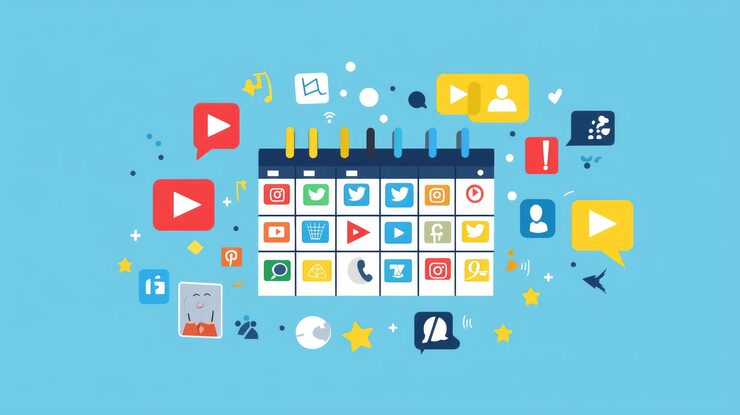Social Media Scheduling Tools have become essential for modern marketers, influencers, and businesses aiming to maintain a consistent online presence. In today’s fast-paced digital world, managing multiple social platforms manually is not only time-consuming but also prone to errors. Using effective scheduling tools allows teams to plan, organize, and execute content strategies efficiently.
The right tools provide insights into engagement metrics, optimal posting times, and audience behavior, enabling brands to craft smarter campaigns. Businesses that adopt these tools often see improved productivity and better alignment between marketing strategies and execution.
Why Social Media Scheduling Tools Are Vital
Consistency is key in social media marketing. Posting at irregular intervals or missing peak engagement hours can reduce visibility and growth. Social Media Scheduling Tools help ensure that content reaches the audience at the most impactful times.
These tools also allow for bulk content uploads, reducing the repetitive effort of posting across platforms. They help teams focus more on creativity, strategy, and engagement rather than logistics.
Popular Social Media Scheduling Tools for Marketers
Several tools have gained popularity for their ease of use and robust features. For example, Hootsuite and Buffer allow users to schedule posts across multiple platforms, analyze performance, and collaborate with team members. These tools also provide visual content calendars, which make planning campaigns easier.
Another innovative tool is Later, which focuses on visual scheduling, particularly for Instagram. Its drag-and-drop interface simplifies arranging posts and tracking engagement metrics. Using Social Media Scheduling Tools like these helps brands maintain a cohesive online identity.
Scheduling Tools That Enhance Analytics and Reporting
Many Social Media Scheduling Tools come with integrated analytics dashboards. These features allow marketers to monitor which posts generate the most engagement, understand follower demographics, and adjust strategies accordingly.
Data-driven decisions improve content relevance, targeting, and ROI. For instance, tools that suggest optimal posting times based on past engagement trends ensure that content reaches audiences when they are most active.
Automation Features to Save Time
Automation is one of the biggest advantages of social media scheduling tools. Automating post distribution across multiple platforms reduces manual work and minimizes human errors. This is particularly valuable for businesses managing multiple campaigns simultaneously.
By integrating automated responses or reminders, brands can also improve interaction with followers without constant monitoring. This balance between automation and personal engagement ensures that social media remains both efficient and authentic.
Collaborative Features for Teams
For businesses with marketing teams, collaboration is key. Tools like Sprout Social and Zoho Social provide team access, role assignments, and approval workflows. This ensures that content meets quality standards before publication.
Social Media Scheduling Tools designed for collaboration enhance efficiency and help maintain brand voice consistency across all social channels. Teams can coordinate campaigns, track deadlines, and review content performance seamlessly.
Integrating Scheduling Tools With Content Strategy
A well-planned content strategy relies on timing, relevance, and audience insights. Integrating scheduling tools into your strategy allows marketers to map campaigns around product launches, seasonal trends, or social initiatives.
For example, using content calendars in scheduling tools enables marketers to align posts with events, promotions, or trending topics. This ensures that content resonates with audiences while maximizing visibility and engagement.
Social Media Scheduling Tools for Influencers
Influencers benefit significantly from scheduling tools. Managing multiple platforms, engagement, and collaborations can be overwhelming. Tools that automate post timing, track engagement, and provide performance analytics allow influencers to focus on creative content.
Using Social Media Scheduling Tools ensures that followers receive consistent updates, which strengthens trust and boosts follower growth. Many tools also allow cross-platform posting, which streamlines content distribution for influencers.
Enhancing Engagement With Timely Posts
Timing plays a critical role in social media engagement. Scheduling tools often provide recommendations for optimal posting times based on historical audience activity. This ensures that content reaches users when they are most likely to engage.
Consistent, timely posting not only increases visibility but also helps build audience loyalty. Businesses and influencers that leverage these insights see higher interaction rates and better overall performance.
Future Trends in Social Media Scheduling
Looking ahead, scheduling tools are expected to integrate more AI-driven features, such as automated content suggestions, sentiment analysis, and predictive engagement metrics. These advancements will allow marketers to plan campaigns more strategically, save time, and deliver content that resonates deeply with their audience.
Adopting Social Media Scheduling Tools early ensures brands remain competitive in an increasingly digital-first landscape. Automation, analytics, and collaboration features will continue to drive productivity and engagement in 2025 and beyond.
Read also:
guides thinkofgames .com
social media girl forum
6477226423
18006688850
dewald brevis height
how do i archive a class in google classroom
shubman gill body measurement
